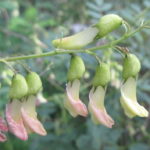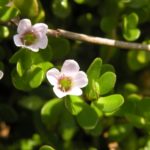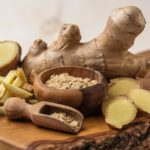
Marijana Jovanovic
(MEnvSci, BNatHerbMed, DipNut)
In traditional Chinese medicine, the medicinal properties of ginkgo have been known for centuries. However, Gingko only gained attention in the 1980s when studies and research started focusing on more natural forms of therapies.
Currently, Ginkgo has shown positive results in conditions such as:
- Glaucoma
- Macular degeneration
- Asthma and interstitial pulmonary fibrosis
- Stress induced hypertension
- Premenstrual oedema
However, Ginkgo is mostly known for its therapeutic effects on brain and mental health, which we discuss in this article.
Introduction
Ginkgo comes from the Ginkgoaceae family.[1] The name Ginkgo originates from a wrong record of the Japanese name Yin-Kwo, which means silver fruit. Biloba refers to the bilobed shape of leaves.[2]
Ginkgo is regarded as the oldest tree that existed for over 270 million years without any changes to its species due to very good resistance to environmental stressors.[2]
As such, Ginkgo has had an important place in Chinese culture for its medicinal, spiritual and horticultural properties for centuries.[2,3]
Other names
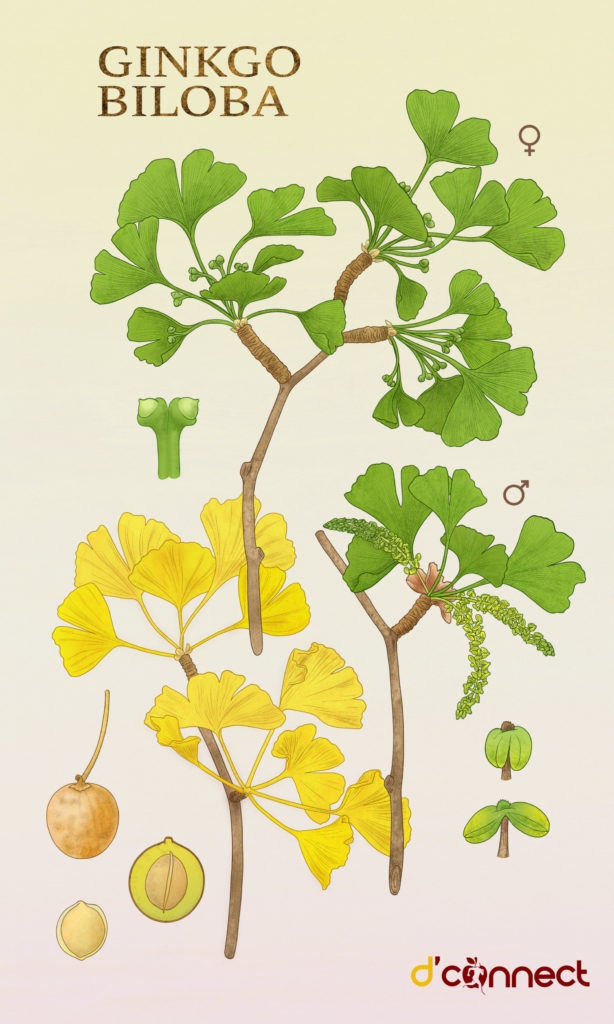
Botanical name: Ginkgo Biloba.
Common names: Duck foot tree, Fossil tree, Ginkgo Folium, Graine de Ginkgo, Herba Ginkgo Biloba, Japanese Silver Apricot, Kew tree.
English: Maidenhair tree (due to a resemblance of the leaf shape and veins to maidenhair fern).
French: ‘L’arbre aux Quarante ecus’ and ‘Noyer Du Japon’.
German: Ginkgo Blatt.
Mandarine: Yin Xing Ye, Bai Guo Ye.
Cantonese: Ngan Hang Yip, Baak Gwo Yip.
Japan: Ginkyo.[1,3,4]
Characteristics
Ginkgo originates from southeast China and it is also native to Germany, Switzerland and France. It is grown commercially in China and South Carolina, United States.
Ginkgo tree is a resinous, dioecious, slow growing tree, which reaches approximately 40 meters in height and can live up to 1,000 years old.
Male trees are more common as the smell of ripe fallen fruits of female trees is unpleasant. Older trees develop irregular branches and deeply fissured bark may appear cork-like.
Leaves are alternate or clustered, fan-shaped, soft green in spring and a rich gold in autumn, and are composed of two or more distinct lobes.[1,4,5]
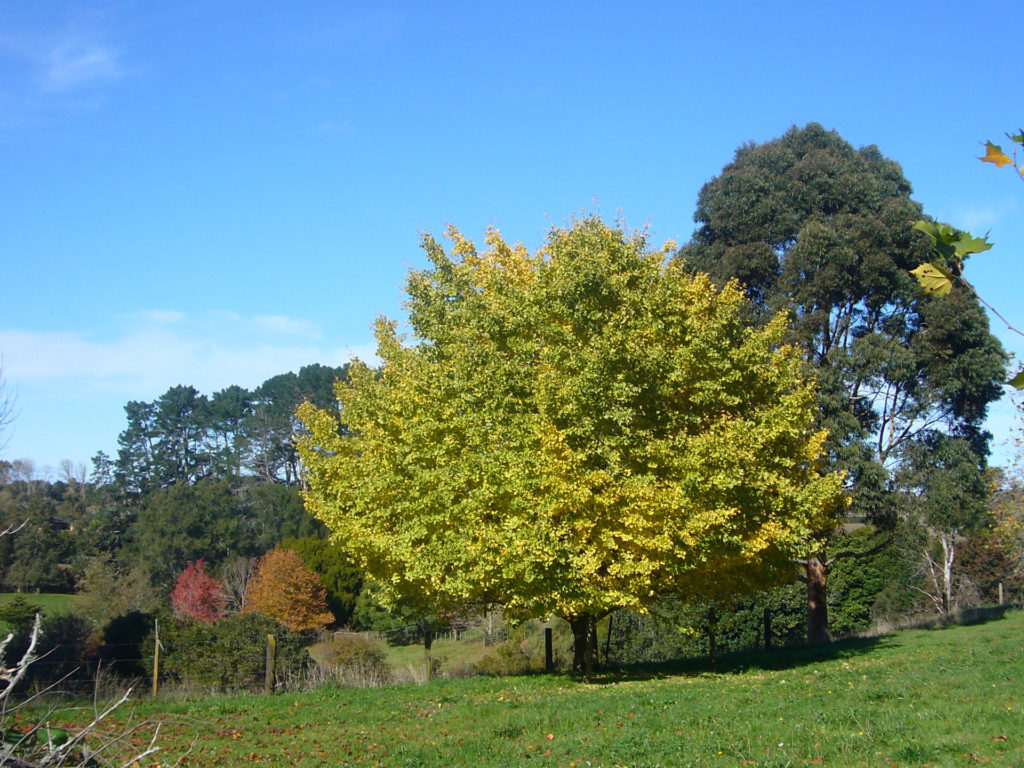
Source: Auckland Botanic Gardens
Ginkgo trees develop seeds once they mature (20-35 years). Their fruit are plumlike, yellow and fleshy with a kernel ripening in late autumn. Ginkgo can be grown from seed, layers and cuttings, and also grown from buds and grafts.[1,4]
Some of many active constituents responsible for Ginkgo’s actions include:
- Flavonoids (0.5-1.6%): flavonol glycosides, flavones and bi-flavones. The flavonoid levels depend on geographical location, and are highest in early summer.
- Terpene lactones (up to 0.23%): (i.e., diterpene lactones known as ginkgolides A, B, C, J and bilobalide).[6,7]
- Sesquiterpene lactone- bilobalide (up to 0.26%).
Leaves from young Ginkgo trees contain higher concentration of terpenes compared to other trees.
Energetic qualities of Ginkgo are sweet, bitter, astringent, neutral and dry.[8]
Use
The leaves are gathered from mid-summer to mid-autumn just before they become yellow. Ginkgo has only recently been introduced to European materia medica, but in Asia and specifically China, ginkgo leaves and seeds have been used in traditional Chinese medicine for centuries.
Ginkgo seeds are also referred to as “nuts”.[1,2,4]
Traditional Use
Gingko is the most valued among medicinal plants and it has been used since 1505 AD.[2]
The Ginkgo tree was traced back 200 million years as a fossil of the Permian period, and that is why it is also called “the living fossil”.[9]
In traditional Chinese medicine ginkgo leaves have been used to “benefit the brain”, heart issues, skin infection, longevity and elimination of filaria-thread-like worms.
Ginkgo nuts were traditionally used for respiratory issues like asthma and coughs, bladder irritations and alcoholism.[4,10]
Medicinal Use
Ginkgo has been known for over 200 million years, but its real medicinal value was recognised again in the last fifty years, because of extensive research available on therapeutic effects of its active constituents.[2]
Ginkgo standardised herbal extract has been registered for use in many countries for treatment of neurological and vascular issues.
Most of the research undertaken on medicinal application of Ginkgo has used specific Ginkgo extract EGb 761 (contains 24% flavone glycosides and 6% terpene lactones) produced from ground-up leaves.[11]
Ginkgo is restorative particularly for the cardiovascular and nervous systems. It has the ability to strengthen blood vessels, dissolve fatty deposits and reduce clotting, as well as promoting clear thinking, relieving depression and as antioxidants reduce free radical damage.
Clinical tests demonstrated that ginkgo helped with chronic venous insufficiency, varicose veins, acute haemorrhoids, angina, recovery from heart surgery, arteritis, type 2 diabetes, oedema, and visual acuity due to impaired retinal flow.[4,8,10,11,12,13]
It has been demonstrated that ginkgo extract has a positive effect on the brain function, by improving memory and enhancing motivation. Ginkgo is used for impaired nervous system in conditions like anxiety, multiple sclerosis, ADHD, schizophrenia, Alzheimer’s dementia and Parkinson’s disease.[1,12,14,15,16,17,18,19]
Ginkgo improves memory and motivation
Some other medicinal uses of Ginkgo include:
- Glaucoma
- Macular degeneration
- Asthma and interstitial pulmonary fibrosis
- Haemorrhoids
- Stress induced hypertension
- Impotence
- Premenstrual oedema
- Sexual dysfunction in women
In the last 20-30 years, ginkgo leaf extract has been one of most prescribed herbs in Germany, France and America.[4,5]
Nutritional facts
Ginkgo contains vitamins A, vitamin B6, C and E.
RELATED — Vitamin B6 (Pyridoxine)
Ginkgo seeds contain high levels of vitamin C, vitamin B2, vitamin B3, sodium, phosphorus, copper, potassium, carbohydrates, proteins, and many other nutrients.[4,10]
RELATED — Potassium (for blood pressure, heart rhythm and pH balance)
| Main nutrition facts | Amount per 100g |
| Minerals | |
| Manganese | 0.113mg |
| Calcium | 2mg |
| Copper | 0.274mg |
| Iron | 1mg |
| Zinc | 0.34mg |
| Magnesium | 27mg |
| Sodium | 7mg |
| Phosphorus | 124mg |
| Potassium | 510mg |
| Vitamins | |
| Vitamin C | 15mg |
| Vitamin B1 | 0.22mg |
| Vitamin B2 | 0.09mg |
| Vitamin B3 | 0.16mg |
| Vitamin B6 | 0.328mg |
| Total folate | 54 µg |
| Vitamin B9 | 0 µg |
| Folate (dietary folateequivalents) | 54 µg |
| Food folate | 54 µg |
| Vitamin B12 | 0 µg |
| Vitamin A | 558 iu |
| Vitamin a (retinol activity equivalents) | 28 µg |
| Retinol | 0 µg |
| Vitamin D | 0 iu |
| Vitamin D | 0 µg |
| Protein and amino acids | |
| Protein | 12.27 ± 0.24g |
| Serine | 0.29g |
| Proline | 0.34g |
| Glycine | 0.23g |
| Leucine | 0.31g |
| Glutamic acid | 0.83g |
| Histidine | 0.1g |
| Valine | 0.28g |
| Phenylalanine | 0.17g |
| Arginine | 0.42g |
| Cystine | 0.02g |
| Alanine | 0.24g |
| Methionine | 0.05g |
| Aspartic acid | 0.54g |
| Lysine | 0.2g |
| Isoleucine | 0.2g |
| Threonine | 0.26g |
| Tryptophan | 0.07g |
| Tyrosine | 0.06g |
| Fats and fatty acids | |
| Total fat | 4.75 ± 0.22g |
| Polyunsaturated fat | 0.618g |
| Monounsaturated fat | 0.619g |
| Saturated fat | 0.319 g |
| Carbohydrates | |
| Carbohydrate by difference | 72.98 ± 0.20g |
| Other nutrients | |
| Ash | 10.01 ± 0.06g |
| Water | 55.2g |
If you are interested to know more about specific vitamins or minerals, we suggest visiting our Nutrients section.
Health benefits
Gingko as an antioxidant
Ginkgo has protective action from free radical damage. It prevents premature aging and decreases the damage caused by environmental toxins, especially chemical pollutants.[20]
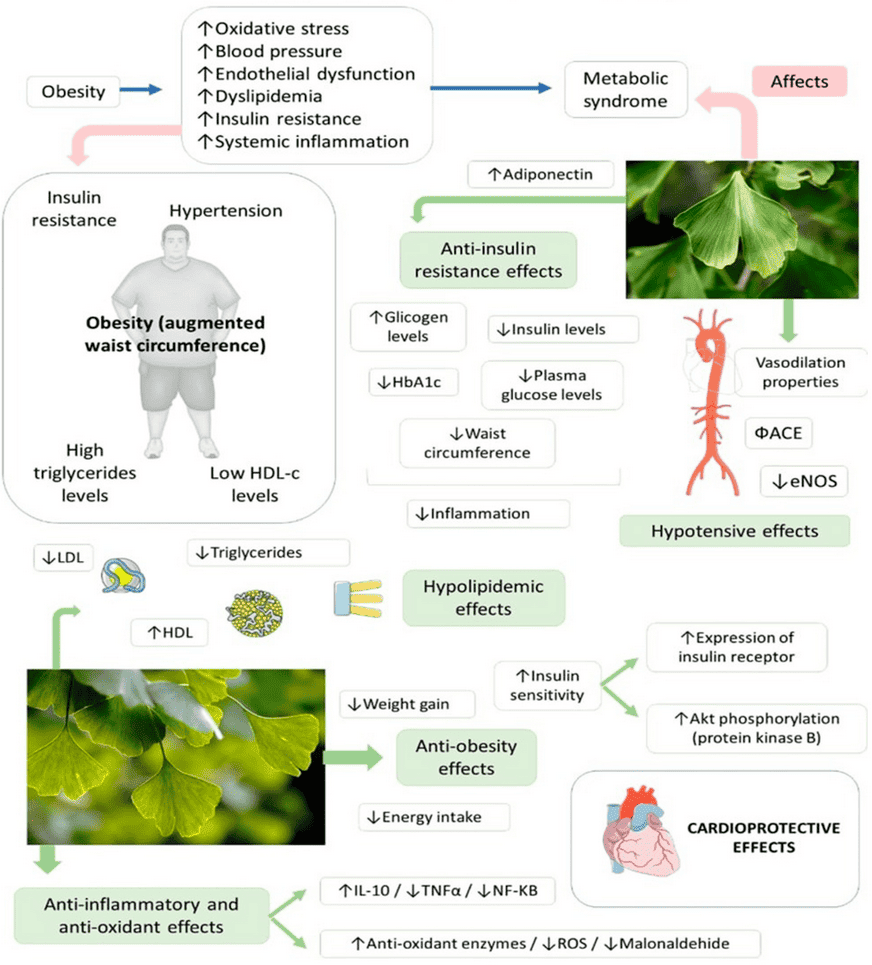
Source: Barbalho, S.M. et al. Ginkgo biloba in the Aging Process: A Narrative Review. Antioxidants (2022)
Ginkgo’s constituents including terpenes, flavonoids, and bioflavonoids contribute to the antioxidant capabilities of the herb, which clears a variety of free radical-generating substances.[8,21]
Studies have shown both in vitro, ex vivo and in vivo Ginkgo’s ability to increase oxygen scavenging, superoxide dismutase activity and cellular glutathione levels.[4]
Antioxidant properties of Ginkgo contribute to protecting the cardiovascular system, brain, and eyes from free radical damage associated with aging.[4,11,21]
Ginkgo and Brain health
Ginkgo is restorative for the nervous system and different brain centres.[8] It helps relieve:
- brain fog
- poor memory
- dizziness
- insomnia
- depression
Ginkgo is one of the most researched herbs for treating and preventing cognitive decline, but it has mixed results.[8]
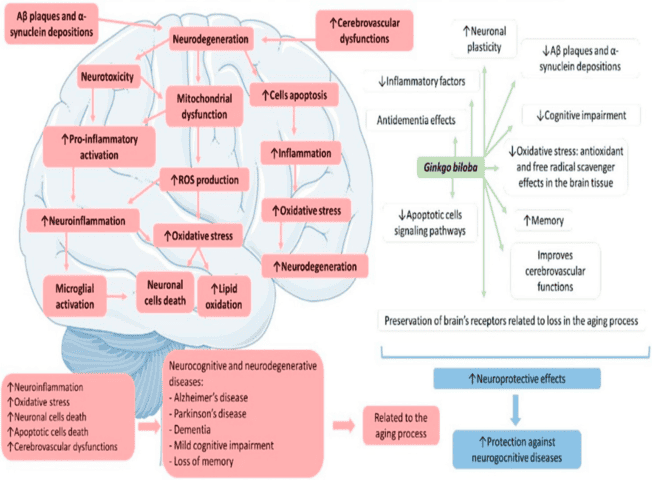
Ginkgo has been approved as a leaf extract for use in the treatment of dementia in Germany, with symptoms of impaired memory, altered concentration and mood, dizziness, tinnitus and headaches. Also, it is used for the treatment of arterial occlusive disease and vertigo.[4]
In Germany Ginkgo is approved for use in treating dementia
Gingko protects neurons from oxidative damage associated with Alzheimer’s and neurodegenerative diseases.
Patients with Alzheimer’s disease have increased levels of beta-amyloid protein that’s accumulated in brain tissue, and over time it becomes neurotoxic.[4,12]
Gingko reduces cell death and beta-amyloid production while safeguarding neurons from its toxic effects. It also inhibits neuropeptide breakdown, crucial for mental function, and contains ginkgolides and bilobalide, which act as antagonists to inhibitory neurotransmitters like GABA, promoting neuronal excitability.
First clinical study on ginkgo extract in the United States was undertaken at six research centres. The 52-week, randomised, double-blind, placebo-controlled, over 300 patients with Alzheimer’s disease or vascular dementia were divided in two groups. One group received 120 milligrams of ginkgo extract a day and the second group placebo.
The result was four points or more improvement on cognitive subscale of the Alzheimer Disease Assessment Scale in groups who received ginkgo extract. This is equivalent to a six month reversal of symptoms and significant improvement in mental function.[22]
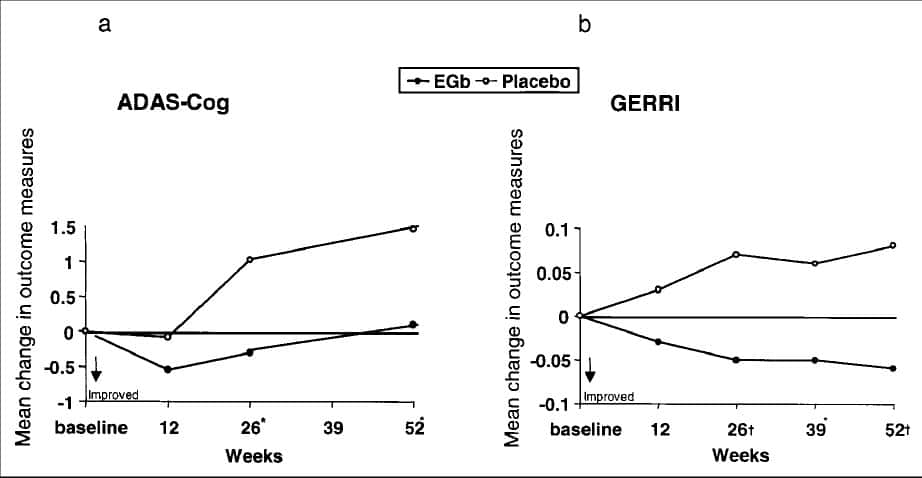
Assessment Scale-Cognitive subscale (ADAS-Cog) and Geriatric Evaluation by Relative’s Rating Instrument (GERRI) at 12-, 26, 39-, and 52-week end points with last observation carried forward.
The Gingko group had 27% improvement compared to 14% in the placebo group. The conclusion was that results were valuable for patients and their families, but further studies are necessary to determine specific patients that can benefit from this treatment.[22] We can see those results below.
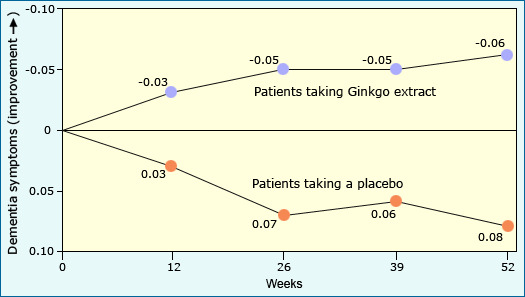
Another randomised, placebo-controlled, double-blind, 42-month long pilot study was conducted to assess the safety and efficacy of Ginkgo biloba extract on reducing the progression of cognitive impairment in elderly people aged over 85.[23]
There were 180 participants, who were given standardised ginkgo extract or placebo. Statistical methods like Kaplan-Meier, Cox proportional hazard, and random-effects models were used to assess the risk of progression from Clinical Dementia Rating (CDR) (0-0.5) and memory function decline, comparing between ginkgo and placebo groups.[23]
However, when considering medication adherence, the GBE group had a lower risk of progressing from CDR = 0 to CDR = 0.5 and showed a smaller decline in memory scores. Importantly, there were more ischemic strokes and TIAs in the GBE group.
Further larger studies taking into account medication adherence are required to clarify protective effects of Ginkgo biloba extract against decline in memory function.[23,24,25]
A placebo-controlled, multi-dose, double-blind, balanced study examined cognitive performance in healthy young participants taking standardised extract of Ginkgo or placebo in the following doses:
- 120mg
- 240mg
- 360mg
Ginkgo administration led to significant changes in performance compared to the placebo.
Notably, a dose-dependent improvement in “speed of attention” was observed at both 240mg and 360mg, lasting up to six hours. Other factors showed time and dose-specific changes, both positive and negative. In conclusion, Ginkgo biloba acutely enhances sustained attention in healthy young individuals.[26]
Many other nervous system conditions may be supported with the use of Ginkgo, which are shown in the table 2.[1,4]
Schizophrenia | Generalised anxiety disorder (GAD) | Multiple sclerosis |
Meniere’s disease | Sleep disturbances | Memory in postmenopausal women |
Colour vision / retinal problems | Prevention of altitude sickness | Retinopathy |
Glaucoma | Vertigo | Neuropathy (IV administration) |
Though the exact mechanism is not well understood, its suggested that the combination of all constituents’ actions including antioxidant effects and increased blood circulation, contributed to dementia treatment.
Ginkgo and Mental health
Ginkgo extract’s ability to improve mood in people with anxiety and depression has been confirmed in many studies.
Due to various side effects of pharmaceutical medications many patients and medical doctors choose herbal medicine such as Ginkgo, St John’s wort, Kava, Valerian for treatment of stress, anxiety and depression over pharmaceuticals.[27]
A study was conducted over a two-year period to assess efficiency and side effects of Ginkgo biloba extract as an additional treatment to anti-depressant medication Citalopram. There were 136 patients, over 60 years of age, equally divided in two groups, where:
- Group 1 received Ginkgo extract (19.2mg, 3 times per day) and anti-depressant Citalopram (30mg once per day)
- Group 2 received only Citalopram (30mg once per day).[27]
Combination of Ginkgo extract and Citalopram demonstrated faster onset of efficiency than single use of Citalopram.[27]
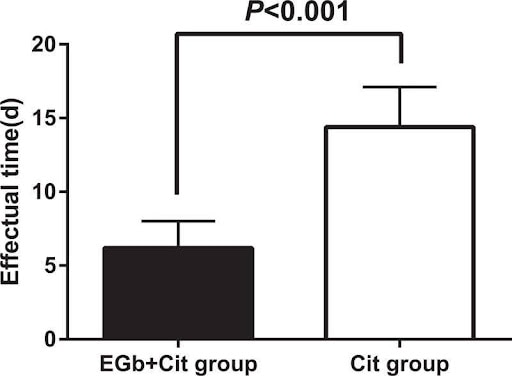
Therefore, it was concluded that Ginkgo extract could be used as a combination therapy with anti-depressants for restoration of neurological function and increase of cognitive function in elderly.
In another study, the mood-stabilising efficacy of EGb 761 Ginkgo extract involved 82 younger patients with generalised anxiety. Administered doses of 480mg or 240mg per day of Ginkgo extract EGb 761 showed a significant, dose-dependent reduction in anxiety symptoms on the Hamilton Anxiety Scale compared to the placebo group over the four-week study period.[28]
Ginkgo extracts active ingredients enhance blood flow, improve hemorheological changes, eliminate free radicals, prevent brain oedema, and inhibit platelet-activating factor.[29]
A 6-week study looking into psycho-education on stress, fatigue and anxiety in refugees, monitored a group of 105 participants. One group was provided with 120mg of Ginkgo biloba per day and psychotherapy, while the other group only attended psychotherapy.[31]
RELATED — Understanding Stress: The Silent Killer
Results demonstrated that psycho-education alone provided no significant improvements while a treatment of Gingko and psycho-education together displayed significant reduction in anxiety and fatigue.
Ginko and Cardiovascular health
Ginkgo has been shown effective in the treatment of:
- Vascular conditions (vascular insufficiency, varicose veins, acute haemorrhoids and acute arterial occlusive disease)
- Angina
- Recovery from heart and cerebrovascular surgery
- Arteritis
- Circulatory issues (oedema, trophic lesions, microcirculation of the skin due to arteriosclerosis).
- Cerebrovascular disorders and or insufficiency including in children with early forms of the disease.
- Visual acuity due to impaired retinal flow
- Type 2 diabetes
RELATED — Diabetes: Early Signs, Causes, Types and Treatment
Ginkgo extract has the function of dilating blood vessels and reducing vascular resistance. It Increases the number and activity of endothelial cells and reduces cytokines associated with endothelial adhesiveness and atherosclerosis development.
Ginkgo improves blood flow and circulation
In addition, ginkgo extract can improve myocardial function recovery.[4,32]
Clinical studies demonstrated that ginkgo extract improved coronary blood flow and circulation in patients with coronary heart disease, as well as in healthy elderly people. Blood flow is improved because Gingko prevents tissue damage by macrophage stimulation to ensure nitric oxide and homocysteine does not build up in tissues.
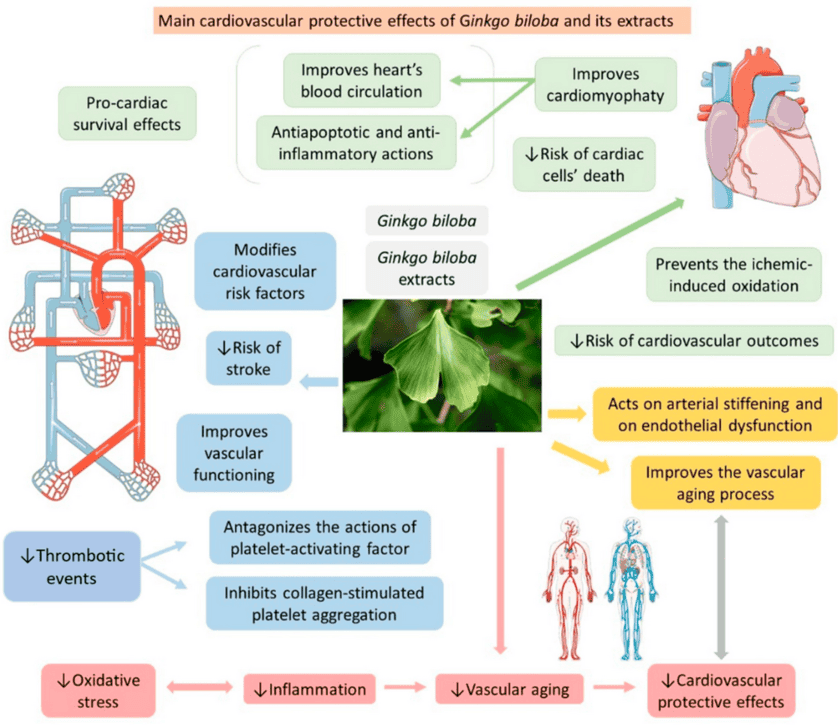
Nitric oxide function is to restrict constrictor capacity of endothelin-1, which is known as endogenous vasoconstrictor.[33,34]
Ginkgo was also found to be useful for treatment of angina pectoris. One study compared conventional pharmaceutical treatment for angina with the same pharmaceutical and addition of ginkgo.
It was found that ginkgo extract in addition to pharmaceutical treatment was superior as ginkgo was acting as anti-inflammatory and reduced inflammation in angina patients.[35]
Ginkgo and wound healing
Gingko is known to stimulate collagen and fibronectin, enhancing growth of skin fibroblasts. It is also anti-microbial and anti-fungal.
Topical preparations may aid protection to skin from free radical damage. When skin and tissue is exposed to very low temperature frostbites are formed that can result in tissue failure and amputation.
One study demonstrated that Ginkgo extract EGb 761 significantly reduced frostbite damage thanks to anti-oxidant activity of Ginkgo constituents.[36]
Therapeutic dosage
The safe dosages include:
- Infusion of dried herb: 2-3g, three times a day
- Standardised extract: 40mg (equivalent to 1.4-2.7g leaves), three times a day
- Fluid extract (1:1): 0.5ml, three times a day[1,4,5]
Most clinical research on Ginkgo used a standardised extract with 24% ginkgo flavone glycosides, at the dose of 40mg, three times a day.
Results of the clinical research recommend that ginkgo extract should be taken for at least 12 weeks.
Safety concerns
Ginkgo is safe and has very low toxicity. In a number of double-blind placebo controlled-studies on patients taking Ginkgo extract reported side effects were very low.
Standardised ginkgo leaf extracts have been used safely in trials lasting from several weeks to up to six years.
The most common side effects, reported in less than 0.001% cases included, gastrointestinal upset, headaches and dizziness.
Ginkgo extract did not alter heart rate and blood pressure, change cholesterol and triglyceride levels or increase intraocular pressure in clinical studies.[1,5,37]
Crude ginkgo plant parts that may contain concentrations higher than 5 ppm of the toxic ginkgolic acid constituents should be avoided, as they can induce severe allergic reactions.
German Commission E set the maximum allowable level for ginkgolic acid of 5 ppm in standardised extracts.[1,4] If unusual bleeding or bruising occurs, stop use immediately.
Although new clinical evidence suggests that Ginkgo does not affect clotting times, it may be sensible to suspend use for one week prior to major surgery in at-risk populations.
Rare case reports have suggested that ginkgo should be used with caution in people with known risk factors for cerebral haemorrhage and epilepsy until further investigation can clarify its safety.
Opposite to ginkgo leaf, nuts inside the ginkgo fruit are considered neurotoxic and cytotoxic and can cause vomiting and convulsion. Fruit pulp can cause erythema and oedema and severe itching.
Ingestion of only two pieces of fruit pulp caused severe gastrointestinal irritation.[4,5]
Possible interactions with medications
Reports of interactions exist for the following pharmaceutical medications:
- Adriamycin
- Antidepressant drugs
- Bleomycin
- Cholinergic drugs
- Cisplatin
- Clozapine
- Doxorubicin
- Haloperidol
- Platelet inhibitor drugs
- Valproate
- Dilantin
- Depakote
- Warfarin[1,4,5,38]
Despite concerns about bleeding risks when combined with anti-coagulants, most studies show minimal impact on bleeding time, platelet aggregation, or safety with aspirin or warfarin.
If you are taking medication, please check with your doctor if you are also able to take Ginkgo.
Possible interactions with herbs and supplements
Reports of interactions exist for St John’s Wort, so if you are looking to take both herbs at the same time, please check with your naturopath.
RELATED — St John’s Wort (Hypericum perforatum)
Summary
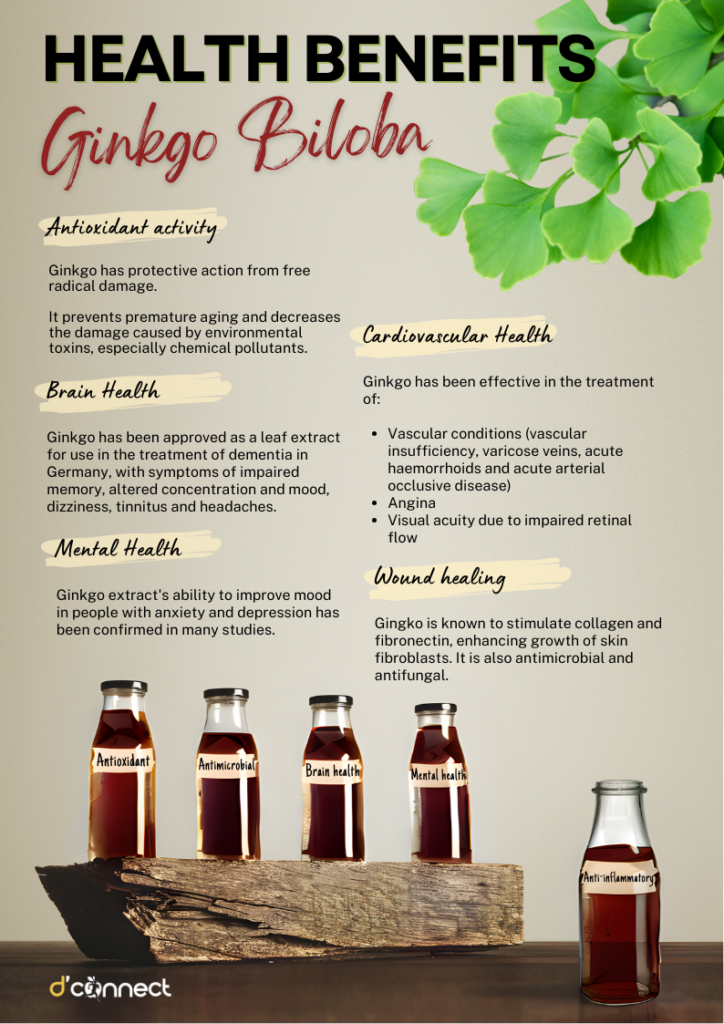
Note — feel free to share or download this illustration.
Related Questions
1. Is it safe to take Ginkgo everyday?
Ginkgo is safe with virtually no side effects in healthy people, so can be taken every day for up to 3-6 months, depending on what condition it is taken for.
In case that you are taking pharmaceutical medications it is recommended to seek advice from the naturopath or the doctor as some contraindications and interactions are possible.
2. Is ginkgo safe for liver health?
Ginkgo has not been implicated in causing liver injury.
This is provided that recommended dose is followed and natural health practitioner is consulted in regards to possible interactions and contraindications.
3. Is it better to take ginkgo in the morning or at night?
In most cases ginkgo is prescribed daily in divided doses, so should be taken in the morning and later in the day or at night.
It all depends on the conditions or symptoms that ginkgo is prescribed for.
If you are looking for articles on similar topics, please see our Herbs section.
Marijana is a qualified Naturopath, Medical Herbalist, Nutritionist and Neo-Shamanic Energy Healer based in Auckland. Marijana’s life path took her from a career in industrial chemistry and environmental science to natural medicine and energy healing.
Marijana’s mission is to share and inspire how to use the healing power of nature for balancing all four bodies — physical, emotional, mental and spiritual. She believes that identifying and eliminating the underlying cause of the health concern is crucial for achieving optimal wellness.
Her genuine empathy creates a safe space for clients to be open, tell their story and articulate challenges honestly. To assist the natural healing process, Marijana recommends a combination of nutritional and lifestyle modifications, herbal medicine, nutritional supplements and energy healing.
Marijana is passionate about mental health and supporting and educating clients about stress, anxiety, depression management and reduction. She is continuously researching and learning about gut health, the gut-brain axis, and gut connection to other body systems, as well as energy healing and spirituality.
Marijana enjoys supporting people to achieve optimal wellness by balancing body, mind and spirit, allowing them to find again their spark and purpose in this life. You can find Marijana at Change Naturopathy and The Life Centre, and follow her on Instagram, Facebook and Youtube.
References
(1) Braun, L., & Cohen, M. (2015). Herbs and natural supplements: An evidence-based guide. (4th ed). Elsevier Health Sciences.
(2) Isah T. (2015). Rethinking Ginkgo biloba L.: Medicinal uses and conservation. Pharmacognosy reviews, 9(18), 140–148. https://doi.org/10.4103/0973-7847.162137
(3) Bone, K., & Mills, S. (2013). Principles and practice of phytotherapy (2nd ed.). Edinburgh, Scotland: Churchill Livingstone Elsevier.
(4) Fisher, C. (2009). Materia medica of western herbs. Vitex Medica.
(5) Murray, M.T. (2013). Ginkgo Biloba (Ginkgo tree). In J. E. Pizzorno & M. T. Murray, Textbook of natural medicine (4th ed., pp. 780-789). St Louis, MO: Elsevier.
(6) Ganora, L. (2009). Herbal constituents. Foundation of phytochemistry. Louisville, CO: Herbalchem Press.
(7) Shareena G, Kumar D (2022). Traversing through half a century research timeline on Ginkgo biloba, in transforming a botanical rarity into an active functional food ingredient. Biomedicine & Pharmacotherapy 153, 113299, 1-16. DOI: https://doi.org/10.1016/j.biopha.2022.113299
(8) Holmes, P. (2007). The energetics of western herbs: A materia medica integrating western & Chinese herbal therapeutics: Vol.1 (Rev. ed.) (4th ed.). Boulder, CO: Snow Lotus Press.
(9) Brondino, N., De Silvestri, A., Re, S., Lanati, N., Thiemann, P., Verna, A., Emanuele, E., & Politi, P. (2013). A Systematic Review and Meta-Analysis of Ginkgo biloba in Neuropsychiatric Disorders: From Ancient Tradition to Modern-Day Medicine. Evidence Based Complementary Alternative Medicine, 915691,1-11. https://doi.org/10.1155/2013/915691
(10) Tabassum, N.E., Das, R., Lami, M. S., Chakraborty, A. J., Mitra, S., Tallei, T. E., Idroes, R., Mohamed, A. A., Hossain, M. J., Dhama, K., Mostafa-Hedeab, G., & Emran, T. B. (2022). Ginkgo biloba: A Treasure of Functional Phytochemicals with Multi Medicinal Applications. Evidence-based complementary and alternative medicine: eCAM, 8288818. https://doi.org/10.1155/2022/8288818
(11) Zuo, W., Yan, F., Zhang, B., Li, J., & Mei, D. (2017). Advances in the Studies of Ginkgo Biloba Leaves Extract on Aging-Related Diseases. Aging and disease, 8(6), 812–826. https://doi.org/10.14336/AD.2017.0615
(12) Cass, H. (2004). Herbs for the nervous system: Ginkgo, kava, valerian, passionflower. Seminars in Integrative Medicine, 2(2), 82-88. https://doi.org/10.1016/j.sigm.2004.07.001
(13) Silva, H., & Martins, F. G. (2022). Cardiovascular Activity of Ginkgo biloba-An Insight from Healthy Subjects. Biology, 12(1), 15. https://doi.org/10.3390/biology12010015
(14) Ernst, E. (2002). The Risk–Benefit Profile of Commonly Used Herbal Therapies: Ginkgo, St. John’s Wort, Ginseng, Echinacea, Saw Palmetto, and Kava. Annals of internal medicine. (136), 42-53. DOI:https://doi.org/10.7326/0003-4819-136-1-200201010-00010
(15) Haolong, L, Min, Y., & Hongzhu, G. (2020). An Updated Review of Randomised Clinical Trials Testing the Improvement of Cognitive Function of Ginkgo biloba Extract in Healthy People and Alzheimer’s Patients, Frontiers in Pharmacology (10).
(16) Hashiguchi, M., Ohta, Y., Shimizu, M., Maruyama, J., & Mochizuki, M. (2015). Meta-analysis of the efficacy and safety of Ginkgo biloba extract for the treatment of dementia. Journal of pharmaceutical health care and sciences, 1, 14. https://doi.org/10.1186/s40780-015-0014-7
(17) Nowak A., Kojder K., Zielonka-Brzezicka J., Wróbel J., Bosiacki M., Fabiańska M., Wróbel M., Sołek-Pastuszka J., & Klimowicz A. (2021). The Use of Ginkgo Biloba L. as a Neuroprotective Agent in Alzheimer’s Disease. Frontiers in Pharmacology, 12. DOI: https://doi.org/10.3389/fphar.2021.775034
(18) Zhou, X., Qi, Y., & Chen, T. (2017). Long-term pre-treatment of anti-oxidant Ginkgo biloba extract EGb-761 attenuates cerebral-ischemia-induced neuronal damage in aged mice. Biomedicine & Pharmacotherapy, 85, 256-263. DOI: https://doi.org/10.1016/j.biopha.2016.11.013
(19) Rahmannia, M., Ghapanchian, M.J., Bagheri – kelayeh, S., Nejad, S.B., Etedali, A., Rajabalipour, S., Pourmontaseri, H., Orandi, S., Shiri, A.H., & Deravi, N. (2022). Ginkgo biloba leaves extract for the treatment of anxiety, stress, and depression. Bulletin of Integrative Psychiatry, 23(4).
(20) Bonomini, F., Rodella, L. F., & Rezzani, R. (2015). Metabolic syndrome, aging and involvement of oxidative stress. Aging and disease, 6(2), 109–120. https://doi.org/10.14336/AD.2014.0305
(21) Kaur, N., Dhiman, M., Perez-Polo, J. R., & Mantha, A. K. (2015). Ginkgolide B revamps neuroprotective role of apurinic/apyrimidinic endonuclease 1 and mitochondrial oxidative phosphorylation against Aβ25-35 -induced neurotoxicity in human neuroblastoma cells. Journal of neuroscience research, 93(6), 938–947. https://doi.org/10.1002/jnr.23565
(22) Lenzi, P. L., Katz, M. M., Berman, N., Itil, T. M., Freedman, A. M., & Schatzberg, A. F. (1997). A placebo-controlled, double-blind, randomised trial of an extract of Ginkgo biloba for dementia. North American EGb Study Group. JAMA, 278(16), 1327–1332.
(23) Dodge, H. H., Zitzelberger, T., Oken, B. S., Howieson, D., & Kaye, J. (2008). A randomised placebo-controlled trial of Ginkgo biloba for the prevention of cognitive decline. Neurology, 70(19 Pt 2), 1809–1817. https://doi.org/10.1212/01.wnl.0000303814.13509.db
(24) Wettstein A. (2000). Cholinesterase inhibitors and Ginkgo extracts–are they comparable in the treatment of dementia? Comparison of published placebo-controlled efficacy studies of at least six months’ duration. Phytomedicine: international journal of phytotherapy and phytopharmacology, 6(6), 393–401. https://doi.org/10.1016/S0944-7113(00)80066-5
(25) Sharma K. (2019). Cholinesterase inhibitors as Alzheimer’s therapeutics (Review). Molecular medicine reports, 20(2), 1479–1487. DOI: https://doi.org/10.3892/mmr.2019.10374
(26) Kennedy, D., Scholey, A. & Wesnes, K. (2000). The dose-dependent cognitive effects of acute administration of Ginkgo biloba to healthy young volunteers. Psychopharmacology 151, 416–423. https://doi.org/10.1007/s002130000501
(27) Dai, C.X.,Hu, C.C. Shang, Y.S., Xie, J. (2018). Role of Ginkgo biloba extract as an adjunctive treatment of elderly patients with depression and on the expression of serum S100B,Medicine 97(39): pe12421, DOI: 10.1097/MD.0000000000012421
(28) Woelk, H., Arnoldt,K.H.,Kieser, M.,Hoerr R. (2006). Ginkgo biloba special extract EGb 761® in generalised anxiety disorder and adjustment disorder with anxious mood: A randomised, double-blind, placebo-controlled trial, Journal of Psychiatric Research,41 (6) 472-480. DOI: https://doi.org/10.1016/j.jpsychires.2006.05.004
(29) Chen, L. E., Wu, F., Zhao, A., Ge, H., & Zhan, H. (2016). Protection Efficacy of the Extract of Ginkgo biloba against the Learning and Memory Damage of Rats under Repeated High Sustained +Gz Exposure. Evidence-based complementary and alternative medicine: eCAM, 2016, 6320586. https://doi.org/10.1155/2016/6320586
(30) Wu, L., Zhou, X., Xiao, Z., Gao, X., Liu, Z., Zhang, Z. … Wang, T. (2017). Functional expression, characterisation, and application of human S100B . Oncology Reports, 38, 2309-2316. https://doi.org/10.3892/or.2017.5922
(31) Alsmadi, A.M., Tawalbeh, L.,Gammoh, O.S., et al.(2018). The effect of Ginkgo biloba and psycho-education on stress, anxiety and fatigue among refugees. Proceedings of Singapore Healthcare, 27(1):26-32. doi:https://doi.org/10.1177/2010105817716184
(32) Shah, Z. A., Nada, S. E., & Doré, S. (2011). Heme oxygenase 1, beneficial role in permanent ischemic stroke and in Gingko biloba (EGb 761) neuroprotection. Neuroscience, 180, 248-255. DOI: https://doi.org/10.1016/j.neuroscience.2011.02.031
(33) Wu, Y. Z., Li, S. Q., Zu, X. G., Du, J., & Wang, F. F. (2008). Ginkgo biloba extract improves coronary artery circulation in patients with coronary artery disease: contribution of plasma nitric oxide and endothelin-1. Phytotherapy research: PTR, 22(6), 734–739. https://doi.org/10.1002/ptr.2335
(34) Hechtman, L. (2012). Clinical naturopathic medicine (1st ed.). Chatswood, N.S.W: Elsevier Australia.
(35) Li, D. Z., Sharma, R., & Zeng, Q. T. (2005). Effects of Ginkgo leaf extract on function of dendritic cells and Th1/Th2 cytokines in patients with unstable angina pectoris. Chinese journal of integrative medicine, 11(4), 260–263. https://doi.org/10.1007/BF02835786
(36) Md, S., Abdullah, S., Alhakamy, N. A., Shaik, R. A., Eldakhakhny, B. M., Omar, U. M., Eid, B. G., Ansari, A. R., Alamoudi, A. J., Rizg, W. Y., Riadi, Y., Venkateswaran, S. P., & Rashid, M. A. (2022). Development and Evaluation of Ginkgo biloba/Sodium Alginate Nanocomplex Gel as a Long-Acting Formulation for Wound Healing. Gels (Basel, Switzerland), 8(3),189. https://doi.org/10.3390/gels8030189
(37) Chung, H. S., Harris, A., Kristinsson, J. K., Ciulla, T. A., Kagemann, C., & Ritch, R. (1999). Ginkgo biloba extract increases ocular blood flow velocity. Journal of ocular pharmacology and therapeutics: the official journal of the Association for Ocular Pharmacology and Therapeutics, 15(3), 233–240. https://doi.org/10.1089/jop.1999.15.233
(38) Bone K. M. (2008). Potential interaction of Ginkgo biloba leaf with anti-platelet or anti-coagulant drugs: what is the evidence? Molecular nutrition & food research, 52(7), 764–771. https://doi.org/10.1002/mnfr.200700098




